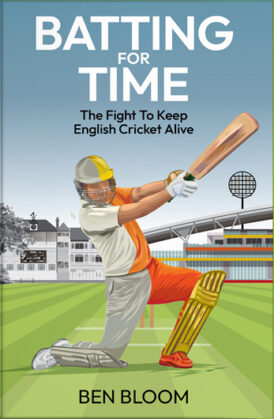Batting For Time
Martin Chandler |Published: 2024
Pages: 240
Author: Bloom, Ben
Publisher: Pitch
Rating: 3.5 stars

The sub-title of this one, The Fight to Keep English Cricket Alive, and the reference in the publisher’s blurb to the exploration of a sport in existential crisis means it is certainly a book that immediately grabs the attention of its reader, and the issues Ben Bloom explores within its covers will come as no surprise to anyone.
I was only a child but do recall that, at the end of the 1960s, there was much debate about how to prevent cricket from falling into oblivion. Back then most male cricket lovers of middle age and above hated the new limited overs formats that were introduced. Personally, I thoroughly approved of the old Sunday League that started in 1969, so the naysayers arguments largely passed me by.
Half a century on and I can see the parallels with that time, although now I am one of those who probably qualifies for the description pale, stale and male. The concept of T20 cricket I have embraced, eventually, and I have enjoyed ‘Bazball’, when it comes off of course, as much as anyone. But franchise cricket generally and ‘The Hundred’ in particular are concepts that thoroughly depresses me.
The above said I have to confess to not being an activist. I have the occasional whinge on social media, but generally just shrug my shoulders and let change I don’t like simply wash over me and confine my positive actions to supporting others from the sidelines.
What this means is that whilst I do understand all of the issues that currently face English cricket, I try not to think about them any more than I have to. Something else I never do is join up the dots, and look at the problems in the round. Knowing that Ben Bloom’s book was going to do that I opened it with a combination of anticipation and trepidation.
And of course Bloom proceeds to look at all of the divisive issues that there are in the game. Inevitably The Hundred looms large, as does the marginalisation of the Championship and the domestic 50 over tournament. Elitism within the game, the demise of the outground and the way in which the county clubs are run are other matters that are covered in depth. Even one of the more positive developments in recent years, the women’s game, is a silver lining with something of a cloud behind it.
The value of Bloom’s work lies in the fact that he spoke to a great many people on both sides of all of the various divides. As a great admirer of those who endeavour to stand up to those who run Lancashire I was particularly interested in the chapter on the Red Rose, those who run the club having always declined to engage with the Lancashire Cricket Action Group. I am not persuaded by what the club say, but at least knowing their views at last is food for thought.
In fact in all respects Bloom sees his mission as explaining all sides’ positions on each of the subjects he looks out without allowing his own views to stray into his writing, and his chapter on The Hundred is a model of impartiality. It even contains some input from some of the ‘new audience’ the format has attracted, the thoughts of whom I, personally, would like to learn a great deal more about.
Have Ben Bloom’s efforts, not that I am suggesting for one moment that changing opinions is what he set out to do, influenced any of my views? Not really is the answer to that one, and he doesn’t change any of my expectations as to what the future holds either, but it is in some ways reassuring to know that the ideas which I remain implacably hostile to at least have some reasoning behind them, flawed as it may be to my mind.
Which all begs the question as to who should read Batting For Time, and the answer to that one is, of course, anyone who has an interest in the future of English cricket. Whether most readers’ views will be coloured in anyway by what they read, given the strength of feeling that exists on the subject, is unlikely but the book will certainly enable those on both sides of the argument to understand the other’s position a little better and as a result, just maybe, help in finding some common ground and, as a result, a solution that we can all live with.






Leave a comment